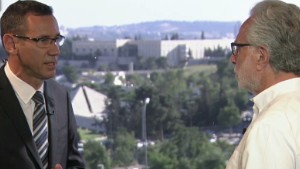Doha, Qatar (CNN) -- As fighting rages between Israel and Hamas militants in Gaza, Hamas' political leader, who lives in Qatar, sat down with CNN for an exclusive interview.
Khaled Meshaal, a 58-year-old former teacher, has had the role since 2004, after Hamas' then-leader, Abdel Aziz al-Rantissi, was killed in an Israeli airstrike.
Meshaal is known as Hamas' external deal-maker, raising money from supporters in the region.
He spoke with CNN's Nic Robertson. Here are highlights from CNN's translation of the interview.

The tunnels
Multiple cease-fire agreements between Israel and Hamas have fizzled in recent weeks. While Israel agreed to the latest one under the condition it would be able to continue destroying militant tunnels into Israel, Meshaal said that's not truly a cease-fire.
"This is because a truce is a truce, but the presence of the Israeli forces inside Gaza and destroying the tunnels means it's an aggression, because they are inside the Gaza territories," Meshaal said, according to a CNN translation.
"The Palestinian resistance has the right to self-defense and the right to deal with the invading Israeli forces who are inside our Gaza territories with necessary means."
Firing rockets from neighborhoods
He told CNN that it would be impossible that there were Hamas fighters in every place where civilians have been killed and buildings destroyed.
"It is unfortunate that the American administration and President Obama adapts the Israeli story, which is a lie. Hamas sacrifices itself for its people and does not use its people as human shields to protect its soldiers. The fighter, just the like the soldier in the army, his job is to protect the people, and not to sacrifice the people for himself."
Hamas' cause
Meshaal said Israel has a powerful military but the Palestinians will triumph.
"We are stronger than they are in the justness of our cause. We are the rightful owners of the land, and they are the thieves of the land. We are the victims and they are the murderers. But despite this we might not win a battle or two completely, but at the end we will win the war. Our steadfastness is a victory. To kill their soldiers while they kill our civilians is also a victory for the Palestinian cause and Hamas."
Egyptian talks
Hamas has agreed to cease-fires through Egyptian mediators "many times" since 2003, he said.
"The Israelis, the Egyptians and the American administration know (this), otherwise John Kerry would not have intervened this time nor (former Secretary of State) Mrs. Hillary Clinton in 2012. They know that Hamas is very credible in that if its leadership promised something, it will fulfill its promise, and the fighters on the ground will follow that."
He said he is still willing to engage in talks with Egyptians acting as the go-betweens.
"Regardless what the others' positions (are), we stated that we are ready to go as a Palestinian delegation to Cairo in order to talk to the Egyptians so they can hold indirect talks between us and the Israelis, so we can reach an agreement that will address our Palestinian demands, headed by ending the siege of Gaza. Then cease-fire can take place. We announced this position before and we are still committed to it."
Peace negotiations
Hamas is not to blame for the lack of a solution, he said.
"We the Palestinian people have, since 1948, have listened to the international community and U.N. and international regulations, in the hope they end the aggression against us. But the international community failed in ending the Israeli occupation and failed in helping our people to have self-determination and have its own state. Even the latest (peace) negotiations, between (Palestinian Authority President Mahmoud) Abbas and (Israeli Prime Minister Benjamin) Netanyahu with Kerry as the broker, were sabotaged by Netanyahu."
Calls for cease-fires
Meshaal said he would support a temporary cease-fire for humanitarian purposes. But he would only support a long-term cease-fire if Israel changes its policy toward restricting the movement of goods and people into Gaza.
"There are two kinds of cease-fires: There is the humanitarian cease-fire, like 72-hour cease-fire that was meant to help and aid our people getting food, water, and help collecting the bodies. As far as the sustainable cease-fire, this is connected to an agreement accepted by the two parties that will guarantee our Palestinian demands headed by lifting the siege on Gaza."

No comments:
Post a Comment